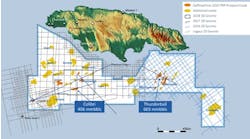Offshore staff
NEW DELHI, India – ONGC Videsh has agreed to farm into 30% of a license offshore Namibia operated by Tullow Oil.
Pending regulatory and partner approvals, ONGC will become a partner inexploration license 0037 covering blocks 2112A, 2012B, and 2113B.
Tullow would remain operator with a 35% stake, the other partners being Pancontinental Namibia (30%) and Paragon Oil and Gas (5%).
In a separate development reported on ONGC’s website, chairman and managing director D.K. Sarraf said the company was still awaiting approval from India’s government for its takeover ofGSPC’s Deen Dayal West (DDW) field in the KG basin offshore eastern India.
Once it does come through, ONGC will complete the transaction as quickly as possible, having already drawn up plans to further develop the DDW field and to integrate the facilities with Cluster 1 of ONGC’s block KG-DWN-98/2.
The company has been in dispute with Reliance Industries about the latter producing ONGC’s gas in connected fields. ONGC also has unconnected fields, but the reserves have been too small to justify capex for a standalone development.
Now, however, the gas from the unconnected fields can be produced using GSPC’s infrastructure, comprising a gas processing platform, pipeline to shore and an onshore gas terminal. ONGC also plans to use these facilities for monetizing some of its high-pressure/high-temperature discoveries in nearby areas.
As for India’s new open acreage policy, Sarraf believed this would be “a game-changer. First, instead of the government specifying to E&P companies where to explore and exploit hydrocarbons, companies will now be able to carve out their own blocks.
“The backbone for this – the National Data Repository – has been launched. This contains huge a database, including processed seismic data, well logs, and reports on India’s hydrocarbon basins. Further, ONGC and Oil India have been assigned the task of coordinating acquisition of seismic data in unexplored areas, which will become a part of this depository.
“Second, the open acreage bidding round is based on revenue sharing instead of production sharing. Revenue sharing is going to be far more investor-friendly, as this ensures less interference by the government.”
07/05/2017


